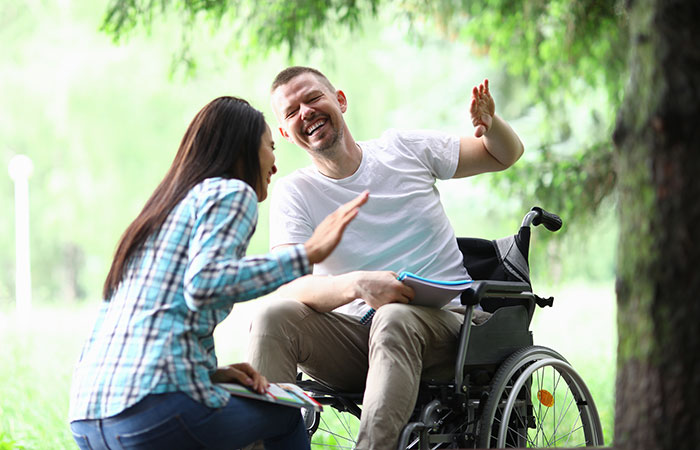Improving Health of People with Disabilities
‹View Table of Contents


CDC’s National Center on Birth Defects and Developmental Disabilities (NCBDDD) works to ensure that people with disabilities have the same opportunities for good health as people without disabilities.
Disabilities may include difficulty with movement, attention, social interaction, hearing, seeing, concentrating, remembering, emotions, or making decisions. Many people will experience a disability during their lifetimes, but having a disability does not mean that a person is unhealthy or cannot be healthy. People with disabilities need healthcare services and programs that provide information for optimal health for the same reasons everyone else does—to stay well, active, and participate fully in their communities. CDC works to ensure that people of all abilities can live their lives to the fullest.
Accomplishments

- Supported the inclusion of people with disabilities in state, territorial, and local health department preparedness and response efforts. Disability specialists served as subject matter experts embedded in public health emergency preparedness planning and response programs. This was accomplished in partnership with the Association of State and Territorial Health Officials and the National Association of City and County Health Officials (NACCHO). Also, in collaboration with NACCHO, supported 2 additional graduate students, 19 total since the program began, to be a voice for people with disabilities in local health departments through a Health and Disability Fellowship program.
- Led efforts to increase inclusion of people with disabilities in public health data to learn more about health disparities, focus disease prevention and health promotion activities, and evaluate outcomes. Efforts focus on increasing the use of standard disability questions in data collection systems. Collaborations also help enhance the use of administrative and survey data in identifying people with disabilities.
- Developed new Easy to Read information on COVID-19 booster shots and COVID-19 Community Levels. These materials provide critical information in an accessible format for all people, including people with intellectual and developmental disabilities.
- Accelerated surveillance and research to improve the lives of people living with congenital heart defects, muscular dystrophy, and spina bifida. Studying health issues and needs throughout life can provide data to plan for services and ensure that people with these conditions receive the care they need. In 2022, NCBDDD
- Provided data showing that hospitalized patients with heart defects are up to twice as likely to have severe outcomes of COVID-19 illness as hospitalized COVID-19 patients without heart defects. NCBDDD also found that 40% of adults with heart defects have a disability. Adults with heart defects are diagnosed more frequently with post-traumatic stress disorder, anxiety, and depression, as well as early-onset dementia.
- Developed and launched the Congenital Heart Defects Toolkit for Physicians to promote lifelong congenital cardiac care for people with heart defects.
- Identified needs and care opportunities for people living with muscular dystrophies. Data from Muscular Dystrophy Surveillance, Tracking, and Research Network showed that specific use of glucocorticoids (steroids used to help maintain muscle strength), use of assistive devices for coughing, and scoliosis (spinal curvature) surgery all improved survival. Data also showed that there has not been improvement in the time to diagnosis for individuals with Duchenne muscular dystrophy (DMD). Families without a history of DMD wait an average of 2.2 years to receive a diagnosis.
- Analyzed data from the more than 11,000 National Spina Bifida Patient Registry participants to better understand the relationships between medical procedures and health outcomes. Research from 2021 explored treatment for tethered spinal cord release by age; the relationship between motor level and baseline transfer ability; and outcomes of fetal surgery compared to surgery after birth for Chiari II malformation.
Looking to the Future
NCBDDD is dedicated to promoting inclusive communities, programs, and policies that provide opportunities for people with disabilities and their families to live full, healthy lives. NCBDDD plans to continue to provide guidance to partners to help public health programs become fully accessible and inclusive by offering effective tools and resources to improve the accessibility of program materials focused in particular on healthy living (such as physical activity and nutrition) and COVID-19 guidance. NCBDDD is also committed to ensuring people with heart defects, spina bifida, and muscular dystrophy are aware of the specialized care they need to live healthy lives. Continuing to strengthen NCBDDD’s surveillance systems will help address gaps in knowledge through each stage of life, such as the often-difficult transition of health care for adolescents with disabilities into adulthood. NCBDDD will continue to promote the healthy development and inclusion of people with disabilities across their lifespans.
Notable Scientific Publications
- Downing KF, et al. Preventive Dental Care and Oral Health of Children and Adolescents with and Without Heart Conditions — United States, 2016–2019. MMWR Morb Mortal Wkly Rep. 2022;71:189–195.
- Farr SL, et al. Prevention and Awareness of Birth Defects Across the Lifespan Using Examples from Congenital Heart Defects and Spina Bifida. Birth Defects Res. 2022;114(2):35–44.
- Horner-Johnson W, et al. Time Trends in Emergency Department Use Among Adults with Intellectual and Developmental Disabilities. Disabil Health J. 2022;15(2):101225.
- Koyama AK, et al. Severe Outcomes, Readmission, and Length of Stay Among COVID-19 Patients with Intellectual and Developmental Disabilities. Int J Infect Dis. 2022;116:328–330.
- Paramsothy P, et al. Selected Clinical and Demographic Factors and All-cause Mortality Among Individuals with Duchenne Muscular Dystrophy in the Muscular Dystrophy Surveillance, Tracking, and Research Network. Neuromuscul Disord. 2022;32(6):468–476.
- Simeone RM, et al. Post-traumatic Stress Disorder, Anxiety, and Depression Among Adults with Congenital Heart Defects. Birth Defects Res. 2022;114(3-4):124–135.
- Theis KA, et al. Prevalence of Arthritis and Arthritis-attributable Activity Limitation—United States, 2016–2018. MMWR Morb Mortal Wkly Rep. 2021;70(40):1401–1407.
- Thomas S, et al. Time to Diagnosis of Duchenne Muscular Dystrophy Remains Unchanged: Findings from the Muscular Dystrophy Surveillance, Tracking, and Research Network, 2000–2015.Muscle Nerve. 2022;66(2):193–197.
- Yuan Y, et al. COVID-19 Cases and Hospitalizations Among Medicare Beneficiaries with and Without Disabilities—United States, January 1, 2020–November 20, 2021. MMWR Morb Mortal Wkly Rep. 2022;71(24):791–796.
- Zhang QC, et al. State-specific Prevalence of Current E-cigarette Use by Disability Status and Disability Type—United States, BRFSS 2016–2018. Disabil Health J. 2022;15(1):101182.
Table of Contents
- NCBDDD Fiscal Year 2022 Annual Report
- Message from the Director
- Saving Babies Through Surveillance, Research, and Prevention of Birth Defects and Infant Disorders
- Helping Children Live to the Fullest by Understanding Developmental Disabilities
- Protecting People and Preventing Complications of Blood Disorders
- ›Improving Health of People with Disabilities
- Fiscal Year 2022 Budget
- NCBDDD Annual Reports Archive